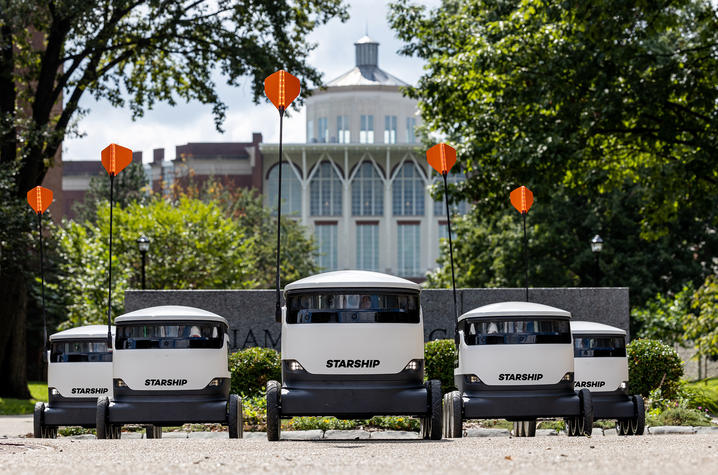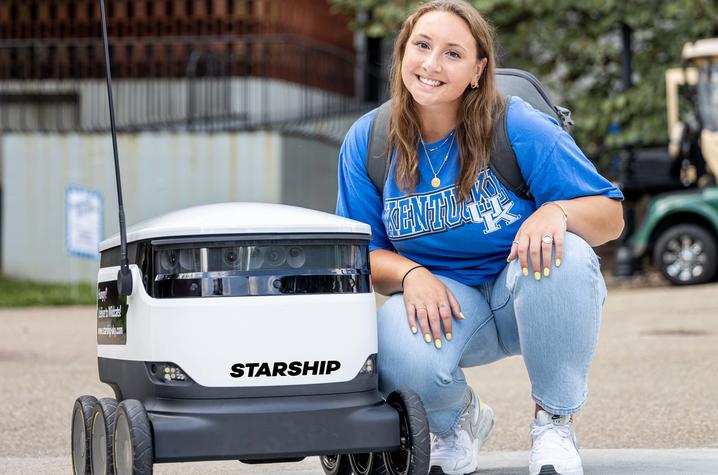UK Partners With Starship to Bring Robot Food Delivery to Campus
LEXINGTON, Ky. (Aug. 24, 2021) — Starship Technologies rolled out its robot food delivery service yesterday on the University of Kentucky’s campus. UK’s partnership with Starship makes it one of 18 schools across the nation to use the robots.
A fleet of 30 autonomous, on-demand robots will deliver from seven campus eateries including Starbucks, Subway and Auntie Anne’s. UK’s students and faculty can now use the Starship Food Delivery app (iOS and Android) to order food and drinks from local retailers to be delivered anywhere on campus, within minutes. The service works in conjunction with UK Dining. The units — such as Starbucks and Panda Express — and hours of service can be viewed in the app. Credit cards, the Plus Account and Flex dollars are all accepted by the app.
Starship is already providing services to campuses across the country including Arizona State University, Purdue University, University of California, Los Angeles, George Mason University, Northern Arizona University and Bowling Green State University.
“We’re excited to bring robot delivery service to Kentucky,” said SVP of Business Development and Sales at Starship Technologies Ryan Tuohy. “UK has a significant impact that extends throughout the state and beyond. We can’t wait to meet all the students on campus and introduce this new technology. We’re confident our robots are going to be warmly accepted and that the students will love the convenience of on-demand delivery.”
To get started, users open the Starship Deliveries app on iOS or Android, choose from a range of their favorite food or drink items, then drop a pin where they want their delivery to be sent. They can then watch as the robot makes its journey to them, via an interactive map. Once the robot arrives, they receive an alert, and can then meet and unlock it through the app. The delivery usually takes just a matter of minutes, depending on the menu items ordered and the distance the robot must travel. Each robot can carry up to 20 pounds — the equivalent of about three shopping bags of goods.
“We have been working with UK Dining on this project for over a year now. It’s great to see the robots delivering across campus. We are pleased to offer such a great service to the students, faculty and staff of UK,” said Scott Henry, interim executive director of the Gatton Student Center.
The robots are sanitized at the end of the day when they return to their storage facility in K-Lair. If a UK Dining employee sees something that has spilled in the robot, they will clean it up before putting the next order inside.
Starship’s zero-emission robots use a combination of sophisticated machine learning, artificial intelligence and sensors to travel on sidewalks and navigate around obstacles. The computer vision-based navigation helps the robots to map their environment to the nearest inch. The robots make more than 80,000 road crossings every day and can also climb curbs, travel at night and operate in both rain and snow.
About Starship Technologies
Starship Technologies is revolutionizing deliveries with autonomous robots. The robots are designed to deliver food, groceries and packages locally in minutes. The delivery robots have traveled millions of miles and completed over 1.6 million autonomous deliveries around the world. They drive autonomously but are monitored by humans who can take control at any time. Starship was founded by Ahti Heinla and Janus Friis (Skype chief architect and co-founder) and Alastair Westgarth is the CEO.


As the state’s flagship, land-grant institution, the University of Kentucky exists to advance the Commonwealth. We do that by preparing the next generation of leaders — placing students at the heart of everything we do — and transforming the lives of Kentuckians through education, research and creative work, service and health care. We pride ourselves on being a catalyst for breakthroughs and a force for healing, a place where ingenuity unfolds. It's all made possible by our people — visionaries, disruptors and pioneers — who make up 200 academic programs, a $476.5 million research and development enterprise and a world-class medical center, all on one campus.




